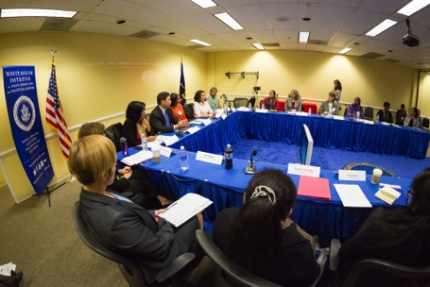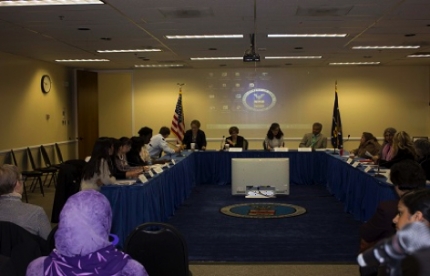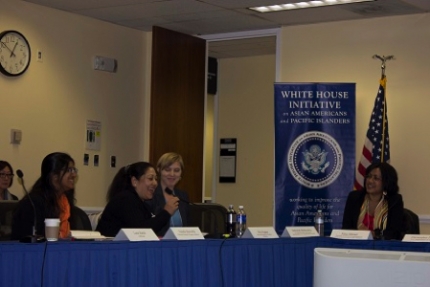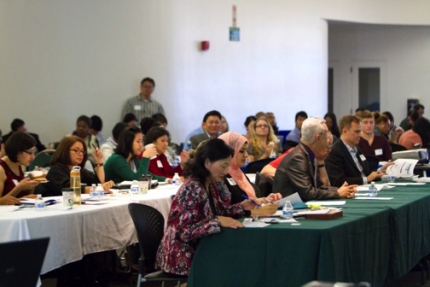Initiative on Asian Americans and Pacific Islanders Blog
Understanding Salon and Domestic Work: Opportunities for Public-Private Partnerships
Posted by on December 2, 2014 at 6:46 PM ESTMany may not be aware of the harsh conditions that beauty salon and domestic care workers face on a daily basis. Among hair and nail salon workers, the vast majority (95 percent) are female, and 42 percent are of Vietnamese descent. These women often work in poorly ventilated workspaces with little protective equipment, putting them at risk of exposure to toxins in the workplace that can cause respiratory and reproductive harm. On the other hand, domestic workers can become victims of wage theft and human trafficking. In fact, much of the domestic care industry is composed of immigrant women who work for private employers, often inside homes, and have no established work standards such as minimum wage, overtime, and sick and vacation pay. In both industries, many of the struggles and challenges for workers occur out of the public spotlight.
The White House Initiative on Asian Americans and Pacific Islanders (WHIAAPI) has been working to elevate awareness of the barriers that these workers face. On November 13, 2014, WHIAAPI, along with the Environmental Protection Agency (EPA) and the Occupational Safety and Health Administration (OSHA) of the U.S. Department of Labor, held the final Salon Safety Interagency Working Group (IWG) meeting to acknowledge the accomplishments of IWG members as well as discuss the ongoing need to protect salon worker health and safety. Members of the Salon Safety IWG, including EPA, OSHA, the Food and Drug Administration (FDA), the National Institute of Occupational Safety and Health (NIOSH), the National Institute of Environmental Health Sciences (NIEHS), and the Small Business Administration (SBA), have been working together since May 2011 to raise awareness, coordinate, and implement plans for the improvement of salon worker health and safety.
At least 20 members from federal agencies and salon worker advocates from the National Healthy Nail and Beauty Salon Alliance (Alliance) were present and shared their progress and achievements such as translating materials on nail salon safety and health in Korean, Nepali, Spanish, and Vietnamese as well as launching educational web resources on hair salons, nail salons, and dangerous chemicals in beauty products. Several salon owners and workers also shared their stories of working to limit exposure to toxins in their own salons. Finally, the IWG and the Alliance members discussed opportunities for collaborating to continue progress towards greater safety of the salon industry.
In the latter half of the day, WHIAAPI partnered with foundations and funder affinity groups such as Asian Americans/Pacific Islanders in Philanthropy, Ford Foundation, Grantmakers In Health, Groundswell Fund, Health & Environmental Funders Network, Ms. Foundation for Women, Rachel’s Network, Rose Foundation for Communities and the Environment, and Women Donors Network, for a special philanthropic briefing, “Low-wage and Immigrant Women’s Work: Opportunities and Challenges for Improving Salon and Domestic Work in the U.S.”
The briefing showcased critical issues facing both salon and domestic workers, who are predominantly low-wage, immigrant women of color working in industries falling outside traditional workforce protections. WHIAAPI was joined by over 60 attendees, including salon and domestic workers, advocates, philanthropic leaders, and officials from several federal agencies. The goals for this event were:
- To raise the profile of salon and domestic workers through their testimonials;
- To educate and engage a wide set of funders/donors on the opportunities and challenges facing low-wage and immigrant women salon and domestic workers;
- To discuss policy and regulatory reforms needed to advance workers health, safety and rights; and
- To explore opportunities for unique public-private partnerships.
Deputy Secretary of Labor Christopher P. Lu provided remarks commending the workers for their courage to speak out and share their stories. He also recognized that the greatest successes and advancements in our history have come from cross-sector partnerships among private companies, nonprofit organizations, and the government. Afterwards, four women shared their experiences of hardship while working as salon or domestic workers. It was truly inspiring to hear from impacted women on the issues that they face at their respective workplaces. Their testimonies provided a solid foundation to discuss opportunities for pubic-private partnerships to ultimately improve the quality of life for women in these fields.
Overall, the briefing helped solidify for me that more people need to be educated on these issues and that different sectors must partner in order to impact meaningful change.
N. Nina Ahmad is a member of the President’s Advisory Commission on Asian Americans and Pacific Islanders.
Learn more aboutThankful for New Hope for Families with the President’s Executive Action on Immigration
Posted by on November 26, 2014 at 1:12 PM ESTSpeaking at Del Sol High School in Las Vegas, where he laid out his principles for commonsense, comprehensive immigration reform nearly two years ago, President Obama delivers remarks on the new steps he will be taking within his executive authority on immigration.
Last week, I had the great pleasure of joining President Obama at Del Sol High School in Las Vegas as he spoke about new steps he is taking to start fixing America’s broken immigration system. President Obama announced executive actions that can provide nearly 5 million undocumented immigrants, including approximately 400,000 Asian immigrants, with temporary relief from deportation. With over 11 million undocumented immigrants in the United States, nearly 1.3 million are from Asian and Pacific Islander communities.
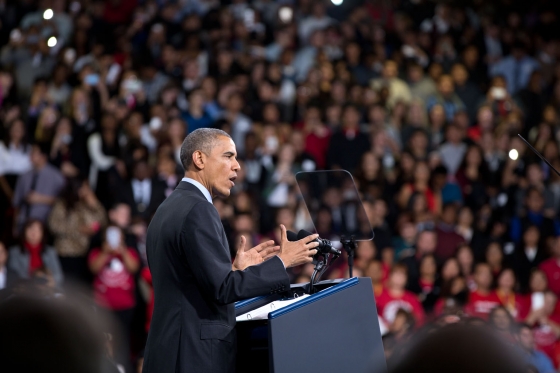
President Barack Obama delivers remarks on immigration at Del Sol High School in Las Vegas, Nev., Nov. 21, 2014. (Official White House Photo by Pete Souza)
Standing before a packed auditorium, President Obama inspired hope for me and so many Americans, as well as those who already consider themselves Americans. These executive actions will provide sweeping reforms to the current immigration system by securing our borders and protecting Americans by prioritizing the removal of felons, not families. It will provide a way for those living in the shadows to come forward if they pass national security and criminal background checks, pay a fine, and contribute their fair share of taxes. The President’s actions will also grow our economy, reduce our deficit, and create jobs.
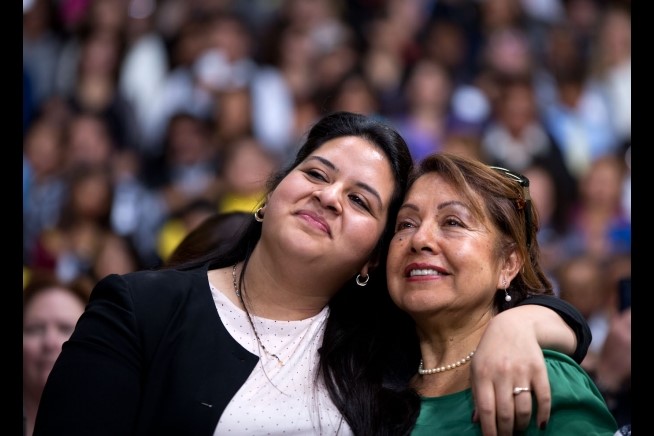
Audience members, Lorella Praeli (left) and Chela Praeli (right), react as President Barack Obama delivers remarks on immigration at Del Sol High School in Las Vegas, Nov. 21, 2014. (Official White House Photo by Pete Souza)
I was brought to tears hearing the story of Astrid Silva, a young undocumented student who knew she could not have the same childhood as her peers and who was unable to attend the funeral of her grandmother overseas. Like Astrid, millions of undocumented individuals live in fear and are separated from their families. With the President’s executive actions, Guo Qiang Ye, father of four children all born in the United States, can now apply for deferred action to be with his family without the fear of deportation. If approved under the program and granted permission, Mr. Ye will also be able to visit his ailing mother in Hong Kong who he has not seen since 1996.
The President’s reforms will also provide relief for millions of undocumented workers. With deferred action, they will be better able to avoid exploitation, allowing them to earn at least minimum wage, which also helps protect native-born workers. Families can go to work with the peace of mind that they will not be deported while simply trying to make an honest living. Undocumented workers will also be able to report their income and pay their fair share in taxes.
Due to the inaction of Congress on immigration reform, President Obama is taking actions -- within his executive authority as President -- to make America's immigration system more fair and just. These reforms, however, do not change the law or fully fix our broken system. Only Congress has the authority to create a new law that can replace these actions and fix the whole system. President Obama reiterated that he will continue to work with Congress to make permanent, comprehensive, common-sense immigration reform a reality. As an undocumented child, I received my legal status when Congress last acted on immigration reform in 1986. Now serving at the White House Initiative on Asian Americans and Pacific Islanders, I look forward in the coming months to working with federal agencies and immigrant families on implementing President Obama’s Immigration Accountability Executive Actions. And I stand alongside families across the country in being thankful this holiday season for a new hope for the future.
Learn more aboutYoung Leaders Dialogue on Mental Health: December 9
Posted by on November 25, 2014 at 5:14 PM EST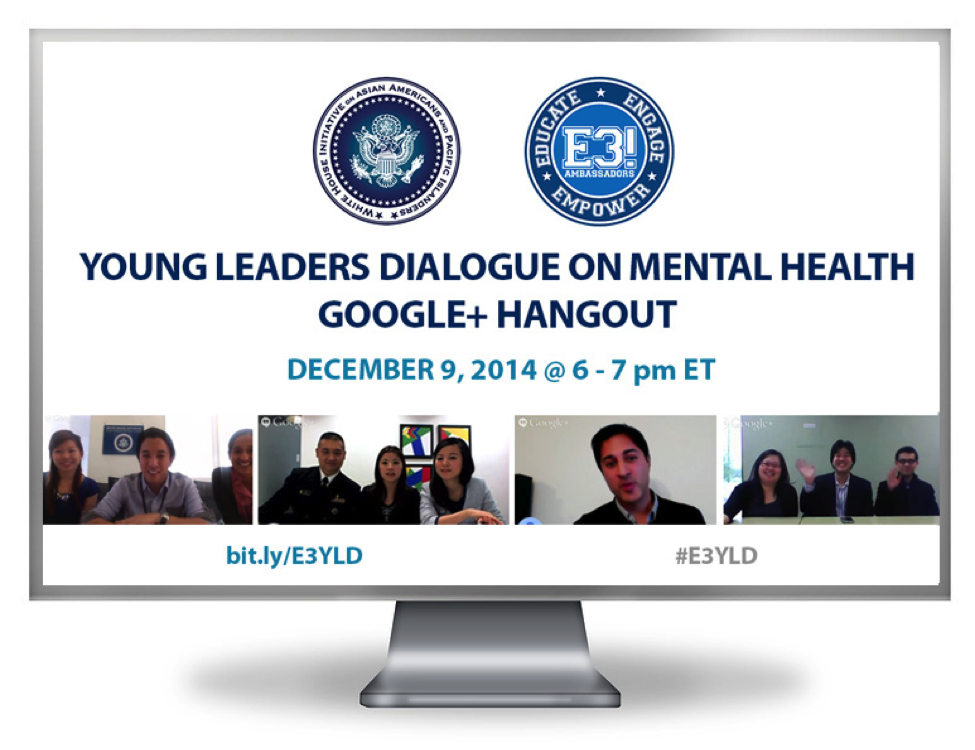
Please join the White House Initiative on Asian Americans and Pacific Islanders (WHIAAPI) and young leaders from across the country on Tuesday, December 9, 2014 from 6:00-7:00 pm ET for our Young Leaders Dialogue (YLD) Google+ Hangout on Mental Health. Similar to the YLD on Education, this YLD will cover a variety of topics around mental health.
Learn more aboutBuilding the Capacity of the Asian American and Pacific Islander Community in Southern California
Posted by on November 21, 2014 at 9:30 AM ESTOn November 5, 2014, the White House Initiative on Asian Americans and Pacific Islanders Region 9/Southern California Regional Interagency Working Group (RIWG) partnered with Asian Americans Advancing Justice—Los Angeles, the Asian Pacific Planning & Policy Council (A3PCON), and East Los Angeles College (ELAC) to host an intermediate-level grant-writing workshop in Los Angeles. Nearly 150 local Asian American and Pacific Islander (AAPI) community advocates and leaders attended the all-day training to gain a deeper understanding of grant research, writing, and approval.
Learn more aboutKnowing Your Rights in Colorado
Posted by on November 20, 2014 at 10:11 AM ESTThe Asian American and Pacific Islander (AAPI) population in the greater Denver area is remarkably diverse – not only in terms of ethnic backgrounds, but also in the range of needs and interests that this AAPI community is dealing with.
In June 2014, the White House Initiative on Asian Americans and Pacific Islanders and its Region 8 Interagency Working Group (RIWG) convened a roundtable with Denver’s AAPI community to engage the community and better understand the challenges that it is striving to overcome. Based on feedback from the event, we have been developing a strategic plan to meet those needs, and on November 6, 2014, the RIWG and WHIAAPI came together again to host a “Know Your Rights” event for the Denver AAPI community.
Learn more aboutUnderstanding the Needs of the Vibrant AAPI Community in Illinois
Posted by on November 20, 2014 at 10:10 AM ESTIllinois is home to about 670,000 Asian Americans and Pacific Islanders (AAPIs) – an extremely diverse group of Americans with cultural heritages including: Bangladeshi, Cambodian, Chinese, Filipino, Hmong, Indian, Indonesian, Japanese, Korean, Laotian, Malaysian, Native Hawaiian and Pacific Islanders, Nepali, Pakistani, Taiwanese, Singaporean, Sri Lankan, Thai, Tibetan, and Vietnamese.
With this immense diversity comes needs that are critical to understand and address. The federal government can play an important role in addressing those needs. On October 29, I had the privilege, alongside federal representatives from 12 agencies, to hear from more than 70 AAPI community leaders at the WHIAAPI Region 5 AAPI Community Listening Session. Our goal was to clearly understand the diversity of needs of the Chicago and Illinois AAPI community and to develop tangible recommendations on how our Region 5 Interagency Working Group can address these needs.
Learn more about
- &lsaquo previous
- …
- 5
- 6
- 7
- 8
- 9
- 10
- 11
- 12
- 13
- …
- next &rsaquo
White House Blogs
- The White House Blog
- Middle Class Task Force
- Council of Economic Advisers
- Council on Environmental Quality
- Council on Women and Girls
- Office of Intergovernmental Affairs
- Office of Management and Budget
- Office of Public Engagement
- Office of Science & Tech Policy
- Office of Urban Affairs
- Open Government
- Faith and Neighborhood Partnerships
- Social Innovation and Civic Participation
- US Trade Representative
- Office National Drug Control Policy
categories
- AIDS Policy
- Alaska
- Blueprint for an America Built to Last
- Budget
- Civil Rights
- Defense
- Disabilities
- Economy
- Education
- Energy and Environment
- Equal Pay
- Ethics
- Faith Based
- Fiscal Responsibility
- Foreign Policy
- Grab Bag
- Health Care
- Homeland Security
- Immigration
- Innovation Fellows
- Inside the White House
- Middle Class Security
- Open Government
- Poverty
- Rural
- Seniors and Social Security
- Service
- Social Innovation
- State of the Union
- Taxes
- Technology
- Urban Policy
- Veterans
- Violence Prevention
- White House Internships
- Women
- Working Families
- Additional Issues
